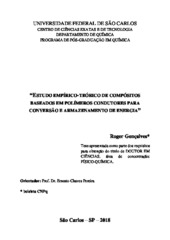Estudo empírico-teórico de compósitos baseados em polímeros condutores para conversão e armazenamento de energia
Abstract
The fast obsolescence of still functional devices causes an extensive e-waste generation and an exacerbated natural resources consumption for the manufacture of new products. In this sense, the development of abundant materials devices-based development, coupled with greater efficiency of conversion, use and storage of energy, are fundamental. Therefore, this thesis presents fundamental studies useful for understanding the behavior of these materials, as well as their applications. The polypyrrole (PPy) electronic structure and growth kinetics were studied using EIS and STM, obtaining important results regarding the exponential increase of the electroactive area during the polymer synthesis, as well as the behavior of its quasi-particles due to electrochemical doping. In addition, it was studied the application of a 2d polymer with graphene-like properties as its possible substitute. This material, called carbon nitride (C3N4), is widely known in the catalysis area, but still poorly explored in electrochemistry. Conductive polymer composites were studied as active materials for the conversion and storage of clean and inexpensive energy. As a result, it was obtained that this material is promising for application in metal-free capacitors, having a great cycling, above 5 K cycles, also increasing the lifespan of a supercapacitor based on PPy, besides obtaining the unprecedented value of 3.0 kF g-1. As for energy conversion, this material demonstrated better compatibility with polythiophene derivatives, promoting better photocurrent in less cathodic potentials, 3 times increase, versus only 2 times increase for reduced graphene oxide in the same conditions. It is concluded, therefore, that carbon nitride is an excellent material for applications in devices based on conductive polymers.
